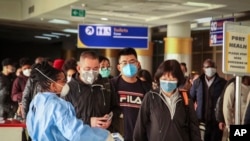A video being shared widely on social media shows an angry crowd threatening two people of Asian descent about the coronavirus. Reportedly recorded in Kenya, a man in the crowd shouts at the frightened couple, “You are corona!” The Asian man responds, “We don’t have corona. Enough!” Finally, a person in the crowd raises his hand threatening to slap the Asian man.
As the coronavirus spreads across continents, it is also spreading fear. In many parts of the world, including Africa, xenophobia, and more specifically, “sinophobia,” the fear of Chinese people, is on the rise. An estimated 1 million Chinese live and work in Africa. Many now face added scrutiny or outright discrimination.
In interviews on the streets of Nairobi, VOA found growing unease about Chinese immigrants.
“When I see a Chinese, I get scared because I don’t know if they are from China or if they were in Kenya before the virus outbreak,” Patricia Wayua, a media consultant in Kenya, told VOA’s Swahili service. “You know how our system is corrupt. You never know. So that’s why when I see a Chinese I get a little bit scared.”
Another pedestrian urged caution. “I don’t think we should discriminate against them per se,” said the man in Nairobi. “My take is that the government should just check to make sure the people who are coming inside the country are screened and all the right procedures are followed. Because we also do business with them and they also employ us and they are also supporting the economy.”
Yoon Jung Park, a professor at Johns Hopkins University and an associate director at the China Africa Research Initiative (CARI), said anti-Chinese sentiment is not new in Africa.
“I would say that across the continent there have been periodic kinds of outbursts of what looks to be anti-Chinese sentiment,” Park told VOA. “Some of the studies that we've done in southern Africa would seem to indicate that sometimes the Chinese are a scapegoat for criticizing the incumbent governments.”
A 2015 study by the Chinese state-funded news site The Paper found that 60% of attacks against Chinese workers abroad took place in Africa. One such incident that gained international headlines occurred in 2010 in Zambia. There, workers who were angered at unsafe conditions at a mine gathered to protest and were shot by Chinese mine managers. The report also found that South Africa was the worst location for such incidents of xenophobia.
Park said the reasons for such attacks vary. Sometimes people are angry that foreigners profit while locals suffer. Other times attackers are angry at their own government for giving opportunities to foreigners.
“I would say it's a combination of factors,” said Park. “There’s some degree of lashing out at the outsider or newcomer who is outcompeting you. But it’s also oftentimes an indication that China is very close to the government that’s in power.”
It is not clear whether the coronavirus will have a long-term impact and worsen Sino-African relationships. The combination of a frightening disease with a foreign origin can lead people to react.
“There’s a tremendous amount of fear about the unknown, and this unknown disease is now attached to Chinese bodies as opposed to, you know, with Ebola, African bodies,” said Park. “I don't know if it’s racism or xenophobia per se, but it is this tendency, I think, that we as human beings have to fear what we don’t know.”
This story originated in the Africa Division with reporting contributions from VOA Swahili service's Collins Liberty Adede and Amina Chombo in Nairobi and Omary Kaseko in Washington.




